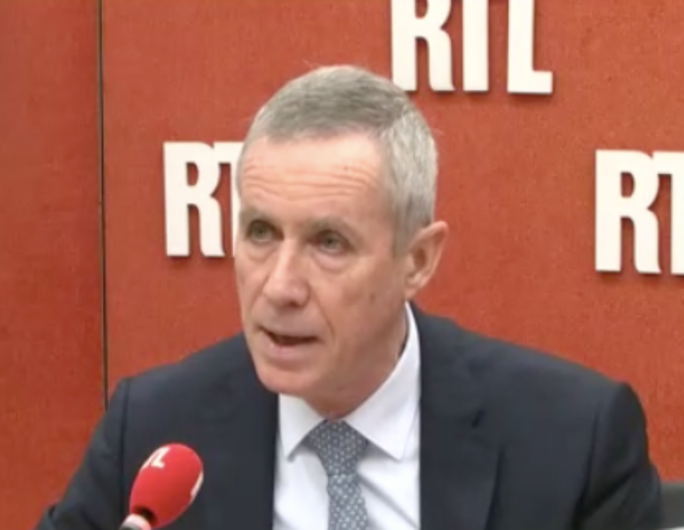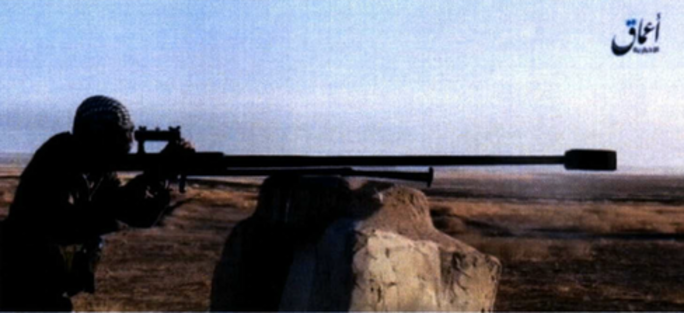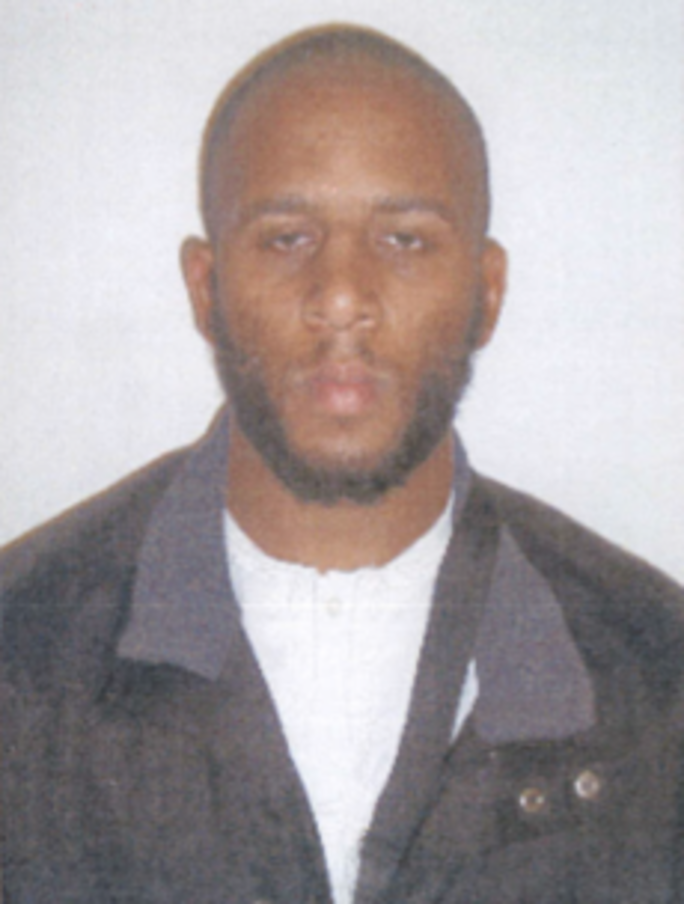Following the significant military defeats of the so-called Islamic State (IS) group over recent months in Syria and Iraq, scores of European jihadists who had joined the ranks of IS have been taken prisoner by local forces.
Along with male jihadists, also detained are several dozen women of French nationality accompanied by a total of 32 children, who are currently in the hands of the predominantly Kurd Syrian Democratic Forces (SDF) and the regular Iraqi army. France appears, at least officially, unwilling to become involved in seeking their repatriation.
In most of the cases, the detained women had left France for the Middle East to serve as jihadists and subsequently married IS combatants. While some took their children with them to Syria or Iraq, others had children after arriving in the region.
Several of the French women, like Emilie König in the video below, have made public their hope of returning to France, while others have remained silent. The mostly Kurdish militia, the People’s Protection Units (YPG), which are the principal force within the Syrian Democratic Forces (SDF), released the video of Koenig and another of Thomas Barnouin, both captured by the YPG. The pair are notable French jihadists, who in their video statements say they have repented, and affirm that they are well treated by their Kurdish captors. The sub-message from the YPG in releasing the videos is to tell the French authorities that in return for managing the problem of the now-displaced French jihadists, Paris should help the Kurds.
About a hundred French nationals, including children, are currently held in the Syrian zone controlled by Kurdish forces. In Iraq, where at least five people of French nationality are currently held, women and men considered to be jihadists face a summary trial and a possible death sentence, as was the case last month of a German woman of Moroccan origin.
“The Iraqis execute anyone, their justice system is corrupt, and jihadists have already escaped from prisons,” commented a Paris lawyer who represents the family of one of the French women held in the region, and who asked for his name to be withheld. “As for the Kurds, they couldn’t give a darn for the French women prisoners. We don’t know for how long they will continue to hold them, to feed them or give them medical care before releasing them into the world.”
From the little available information about the captives in the Kurd-controlled zone, there are contradictory reports about conditions in the prisoner camps. According to some, there are children, detained with their mothers in tents, who are ill and need medical attention. It is reported that in the case of one of the French women, she has asked for her two children, one aged 10 months the other two years, to be sent to France while she remains prisoner.
On the contrary, other reports say that the Kurds are treating their captives well, and that they soon realised the diplomatic leverage afforded by the French prisoners. “The question to ask oneself, is what will happen to these prisoners if ever Kurdistan is invaded by Turkey or Syria,” said lawyer Bruno Vinay, who represents several jihadists currently in the hands of the Syrian opposition forces, the SDF.
It is estimated that a total of 700 jihadists of different nationalities have been tried by the authorities in the Kurd-controlled region of north-east Syria. “Will the Geneva Convention be applied to them, will they be given the status of war prisoner?” asked Vinay. France appears to want to gain time, but will there be a different approach towards the children?”
In face of the problem, the French government has changed its stance over the past months. While approving that French former IS fighters be tried in Iraq, a constitutional state, the situation of those elsewhere would, said President Emmanuel Macron, speaking on November 9th 2017 during a visit to the United Arab Emirates, be reviewed on a “case by case” basis. Then, on January 4th, government spokesman Benjamin Griveaux, speaking on BFMTV, said French jihadists could be tried in Syria, maintaining that the authorities in Kurd-controlled Syria “are able to ensure a fair trial”. On January 14th, interviewed by daily Libération, French defence minister Florence Parly underlined that position, saying “in the part held by the Kurds, the local authorities will pronounce on the eventual responsibilities of French nationals concerning crimes and offences committed in that territory as a result of their membership of a terrorist organisation”.
That position prompted outrage from lawyers representing some of the jihadists and their families, and on January 17th four of them, Marie Dosé, William Bourdon, Martin Pradel and Marc Bailly, announced they had together filed a formal complaint against “persons unknown”, but which in reality targets the French state, for “arbitrary detention” and “abuse of authority”. “We note that the French authorities are perfectly well informed of the presence of these women and these children, sometimes infants, and deliberately choose to abstain from any intervention with the aim of leaving these mothers and children in the hands of the Syrian Kurds and their ‘local authorities’,” read a statement issued by the four lawyers. “Given that Kurdistan has no legal existence and as such has no sovereign institution, these women and children are being held without right or title.”
“The French authorities, through their deliberate inertia, contribute to the continuation of these arbitrary detentions which, furthermore, expose these mothers and children to obvious risks, notably regarding health, in a conflict zone,” the lawyers added.
In a traditional new year address on January 22nd, senior Paris public prosecutor François Molins, who has notably led preliminary investigations into the series of terrorist attacks that have struck Paris since 2015, most claimed in the name of the IS group, detailed what he said were three dangers for France following the “military defeat” of the IS group. These were the threat of further attacks by IS cells operating from abroad, other attacks organised by IS members from within France, and the threat to the prison system “with more than 500 jihadist terrorists”.
“France is today specifically targeted,” said Molins, while also underlining the high risk of attacks against civilians and army personnel “in the Sahara-Sahel zone” in Africa.
Molins said that the Paris prosecution services were leading 489 investigations into 1,533 individuals suspected of involvement in the fighting in Syria and Iraq. He said 676 French nationals were still present in Syria and Iraq, of which 295 are women. “Numerous are those who, in face of the military defeat of the caliphate, want to return to France, and who, men or women, might be disappointed or repented terrorists who remain loyal to jihadist ideology, but also [others who are] terrorists on a mission,” said Molins.

He said that since the summer of 2017, the IS doctrines which barred women from taking part in combat had changed, that “some women were able to take part in fighting” and “their radicalisation, their dangerousness should not be under-estimated”, warning against “all naivety”.
The following day, January 23rd, Molins was interviewed on RTL radio when he said that “there is no typical profile of the French women in Iraq or Syria”, adding that “it ranges from the manipulated birdbrained to the convinced jihadist”. Molins also employed caution with regard to the return to France of those who are the subject of arrest warrants, and added that “the children of jihadists are time-bombs”.
One French magistrate, speaking on condition his name was withheld, told Mediapart that no investigation branch wanted the repatriation of captured jihadists “because most of them have no added value for investigations into attacks committed in France”. He added: “Should the risk be taken that a woman or child returns and one day blows themselves up in a public place?”.
A senior source within the French intelligence services, also speaking on condition of anonymity, told Mediapart that “the people currently detained over there [in Syria or Iraq] offer no operational or judicial interest”, implying that none of those captured are either senior-ranking IS members or implicated in previous terrorist attacks in France. But that was contradicted by another specialist source, who cannot be named, who said that for France “several choice targets in the Iraqi-Syrian region” had been captured.
Meanwhile, French justice minister Nicole Belloubet, interviewed by RTL on January 28th, tempered earlier comments by the government spokesman and defence minister. She said that there were agreements between France and Turkey that allowed for the repatriation of jihadists, and that if a death sentence was pronounced against a French national in Iraq “we would intervene”, but repeated President Macron’s words of last November with regard to those captured in Syria, where she said the situation would be looked at on “a case by case” basis. The justice minister announced that 66 minors who had been returned to France from the combat zones had been placed under the authority of a magistrate and tutors, and that “not one has been released into the wild”. Ten days later, in an interview with BFMTV on February 7th, French foreign minister Jean-Yves Le Drian, admitted the principal that the children of jihadist captives could be “repatriated”.
In face of what is essentially a security-conscious approach to the problem by the French government, but which also takes into consideration the strain that large numbers of repatriated jihadists would place on the justice system and the police, the lawyers representing jihadists’ families counter with arguments of legality and humanitarian considerations.
Mediapart has seen a letter addressed on January 2nd to President Macron by one of the lawyers, whose name is withheld, in which he complains that in one prisoner camps inKurd-controlled Syrian territory, close the Turkish border, “none of the French women prisoners has had contact with the French authorities, neither directly or indirectly, and nor have they been questioned by the French intelligence services”. The lawyer received a reply on January 10th from the director of Macron’s cabinet team, who replied that it was “firstly for the local authorities to pronounce themselves, in respect of the fundamental principles of law, upon the personal responsibility of your client in crimes and offences that they might be accused of”.
In his response on January 22nd, the lawyer underlined that “those ‘accused’ do not have a lawyer, and do not have the right to file an appeal”, concluding that “there therefore exists no fair trial in Syrian Kurdistan, and the decisions delivered by this anti-terrorist court have no value”.
There is also divided opinion on the subject among those with expert knowledge about jihadism. Wassim Nasr, a journalist with the French international news channel FRANCE 24, and the author of a book about the IS group published in France in 2016 under the title L’État islamique, le fait accompli, said that in the long term, and from a geopolitical regard, it is a mistake to leave captured French jihadists to their fate. “One only postpones the problem,” he told Mediapart. “In northern Syria, it is difficult to see beyond six months. A local judicial system – whether of the Kurd or the pro-Turkey rebels – which might sentence a 20-year-old French national, [offers] what certainty that they serve their full sentence and are not freed with the next [phase of] regional turmoil?”
“In the case of established states, of course one can imagine that Iraq or Turkey put French jihadists on trial,” added Nasr. “At the moment, Turkey is playing the game, Iraq also, but tomorrow? What if Paris adopts a position that has the ill fortune of displeasing [Turkish President Recep] Erdoğan? With these prisoners he’s given a means of placing pressure on France.”

Meanwhile, the French intelligence services consider that any exodus of French jihadists from Syria would be necessarily limited by their passage through Turkey. A bilateral agreement between Paris and Ankara signed in 2014, allows for the deportation to France of French jihadists arrested in Turkey, instead of the wider practice of allowing foreign jihadists to freely leave for third countries that require no visa, such as Sudan or Malaysia. To reinforce the net, French security agencies are pressing the government to ensure continued close cooperation with their Turkish counterparts.
In Iraq, there have been a number of cases of mas escapes of imprisoned jihadists. One example involved Peter Chérif, a member of a jihadist group in Paris known as the “Buttes-Chaumont” cell, named after the park in the north of the French capital, who was captured in the Iraqi city of Fallujah in 2004. Chérif, who had joined the al-Qaeda group, was sentenced by an Iraqi court to 15 years in prison, but on March 6th 2007 he escaped jail along with about 150 other inmates when their prison in Badush in northern Iraq was attacked by an armed gang.

Chérif was later detained in Syria, and deported to France in 2008 where he was arrested and later sent for trial for “associating” with “a terrorist enterprise”, namely the “Buttes-Chaumont” cell. He was released from preventive detention before his trial in 2011, and absconded before the court sentenced him to five years in prison. Chérif fled to Yemen, where he joined the ranks of the specific al-Qaeda branch called Al-Qaeda in the Arab Peninsula. French intelligence services suspect Chérif of managing brothers Saïd and Chérif Kouachi, his former friends in the “Buttes-Chaumont” cell, in their mission to attack the Paris offices of satirical weekly Charlie Hebdo, during which they shot 12 people dead on January 7th 2015.
Another prison mass escape in Iraq ocurred on July 21st 2013, when 500 jihadists broke out of the notorious Abu Ghraib jailhouse in Bagdad. Among them were future key members of the Islamic state group.
“To leave jihadists in the outside world can increase the threat, because our intelligence services won’t know where they are when they are released, said Wassim Nasr. European heads of state must assume responsibility and take decisions that don’t please the opinions of their public but which will be fruitful in the long term.”
Jean-Charles Brisard is a French expert on terrorist activities and issues and is the head of the Centre d’analyse du terrorisme, CAT. He argues for the “case by case” treatment of captured French jihadists. “For example, some jihadists took part from a distance in terrorist crimes perpetrated in France. I’m thinking notably about the [Paris] terrorist attacks of November 13th [2015]. For them, it seems to me to be necessary to demand their trial in Paris. For the others, they can very well be tried in the Syrian-Iraqi zone. Certainly, some institutions are fledgling ones, but on condition that the rights of the defence are respected, those entities which captured French jihadists are legitimate in wanting to try them, above all because the essential acts committed by our nationals were done so over there.”
“We shouldn’t find ourselves in a sort of guilt about the French prisoners,” added Brisard. “As of the moment they were captured by foreign forces, they are suddenly placed as ‘victims’. Let’s not forget that they took up arms on behalf of a terrorist organisation. They ask to be tried in France because they hope for greater clemency.”
According to estimations of Brisard’s CAT consultancy, out of 120 French jihadists sent for trial after returning home, the average sentence given to those found guilty of crimes was six years in prison.
“There is no satisfactory solution,” concluded both Wassim Nasr and Jean-Charles Brisard, using identical words in their separate interviews.
-------------------------
- The French version of this article can be found here.
English version by Graham Tearse


